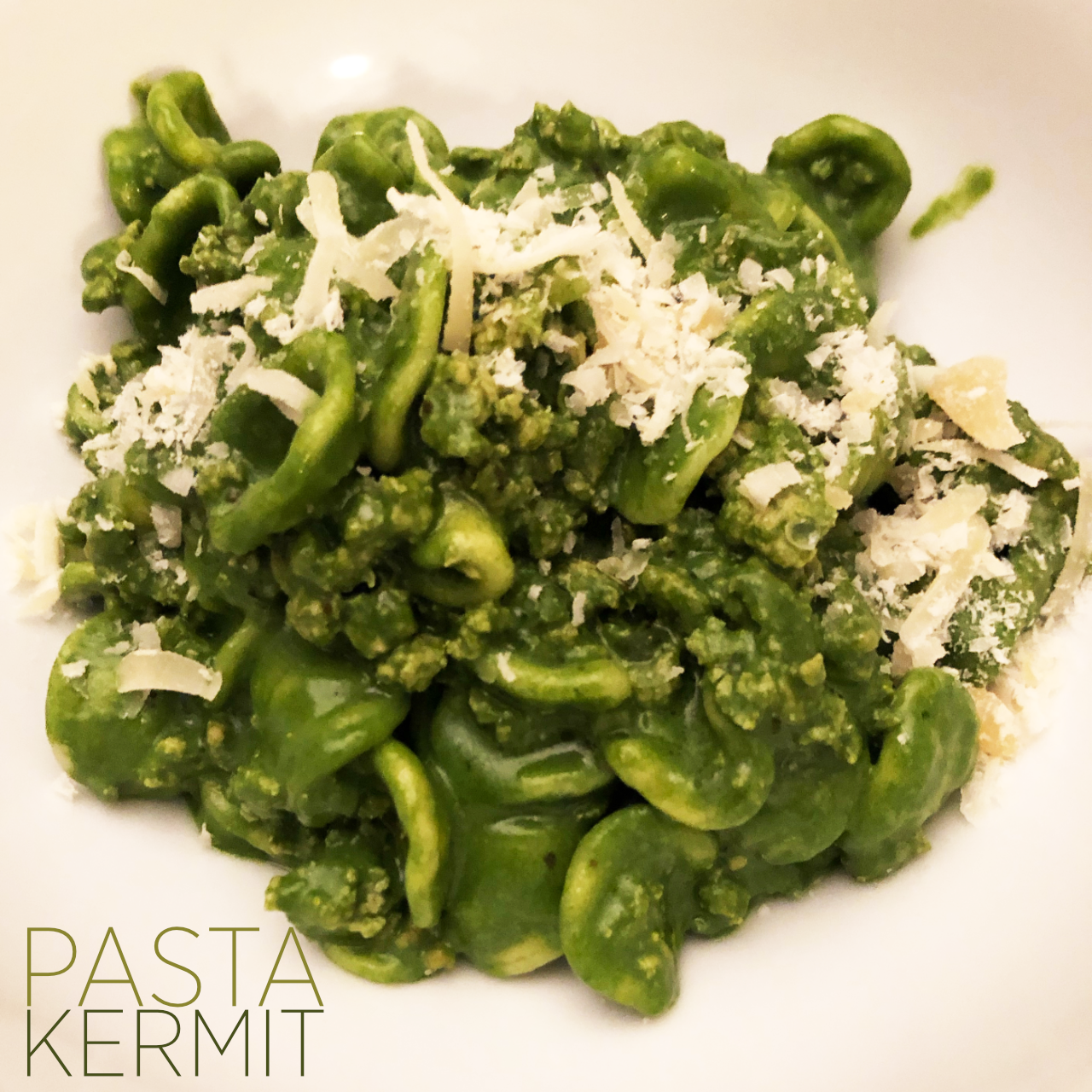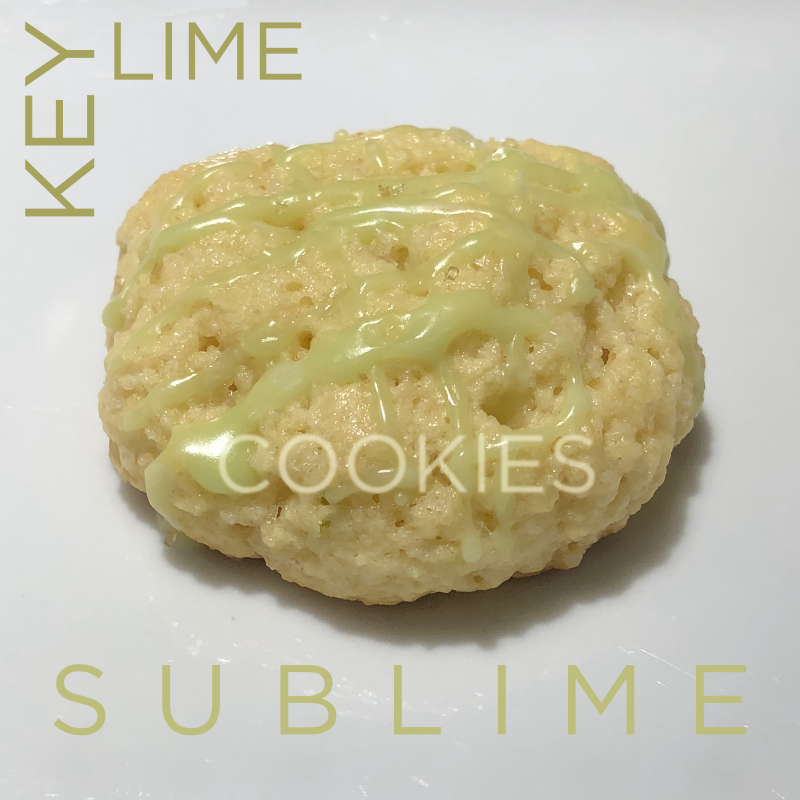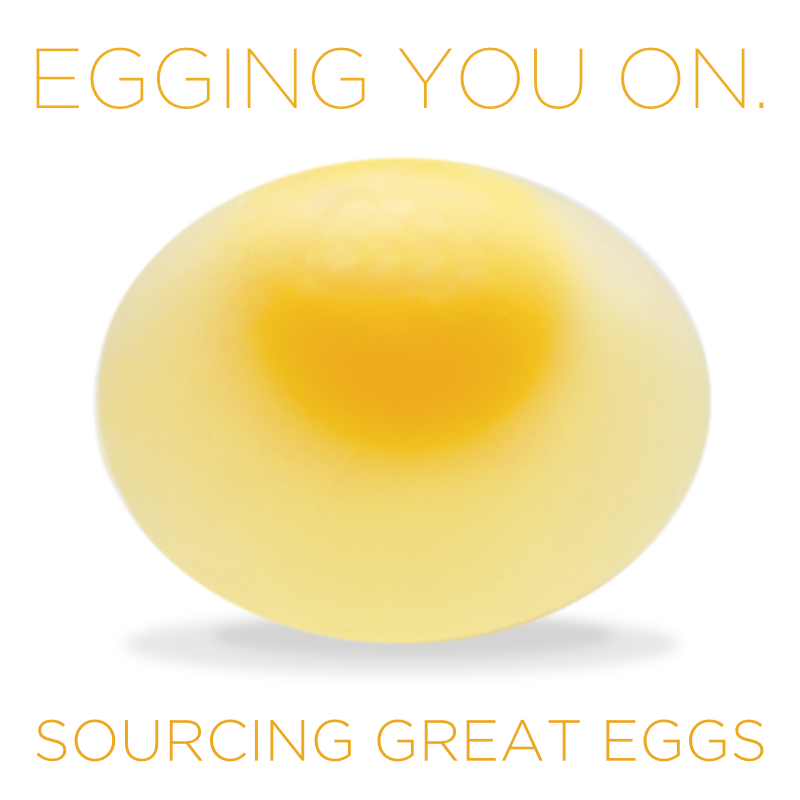
The Five Kinds of Eggs (US)
UPDATED 01.19.2024 – Eggs that are healthier, more nutritious, and actually better to cook with? They start with best practices, at the farm. Sadly, most factory eggs are a long way from a “best” practice.
There are five basic kinds of eggs that you can get in North America: Conventional; Cage-Free; Free-Range; Pasture-Raised; Heritage / Locally Sourced

Your average egg at the supermarket is generally Conventional.
Birds, usually Hybrid White Leghorns, are crammed into small cages, in windowless barns, eating a scientifically structured diet that produces anemic-looking eggs.
Hens are often given hormones. and antibiotics, that end up in their eggs, and you.
They are cheap, but they are not very healthy.
Conventional eggs are higher in cholesterol, and saturated fat, probably because of the hens’ lack of exercise. They are lower in Omega-3, vitamin E, and beta-carotene.
Our recommendation: Unless budget prevents you from buying better, AVOID.

Chickens are still in kept in dense packs in bigger enclosures. Here you’ll find Bovan’s Brown hens which are better suited to living in this level of density.
Not much better, and, not surprisingly, studies find very little improvement in the quality of the eggs, over the conventional egg farming methods.
Price increase? Count on it.
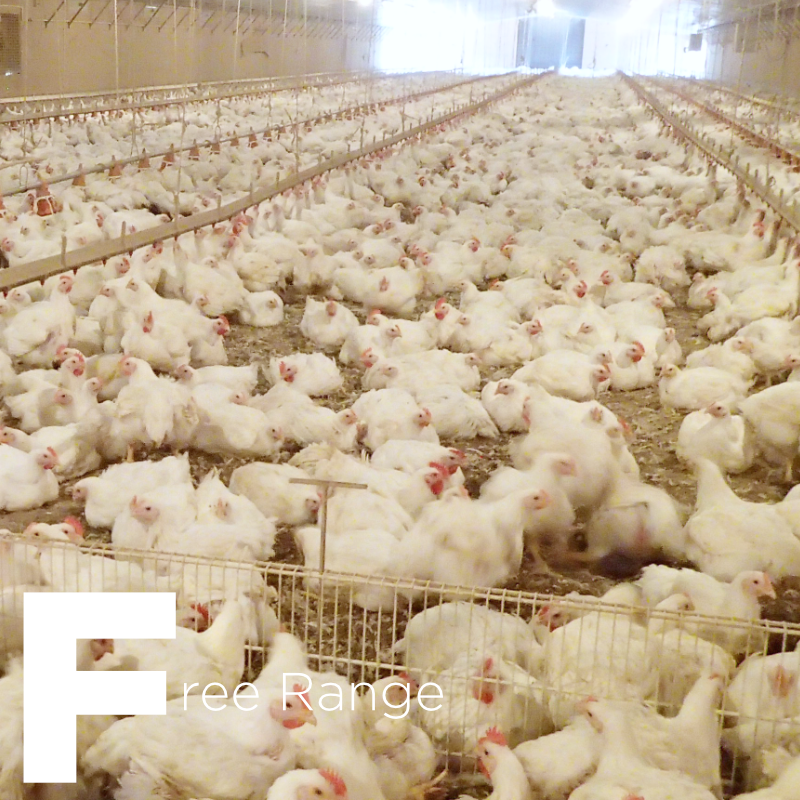
Humane Farm Animal Care’s Certified Humane® sets the “Free Range” standards, as there is no Federal standard.
(There should be one.)
That’s a poulty-puny .19sq.m/2 sq.ft. per bird. These chickens still don’t move around too much.
You’ll find the paler high production eggs of the Hybrid White Leghorn. Ancona, and Minorca hens are also pretty common
“Big Egg,” the industrial egg farmers, try to conflate the “Free Range” category with Pasture-Raised. They’re not the same.
The standard for “humane” treatment is a pretty low bar. All eggs are not created essentially equal.
They pitch ‘romantic’ ad copy, in and around the box, about hens frolicking on ‘sunlit porches’ and other marketing mendacities (lies). The photo above is a free range facility.
Doesn’t look that “free,” now, does it?
More importantly, there is no data suggesting that the quality of the actual egg is better. Yet, you pay more for the label.
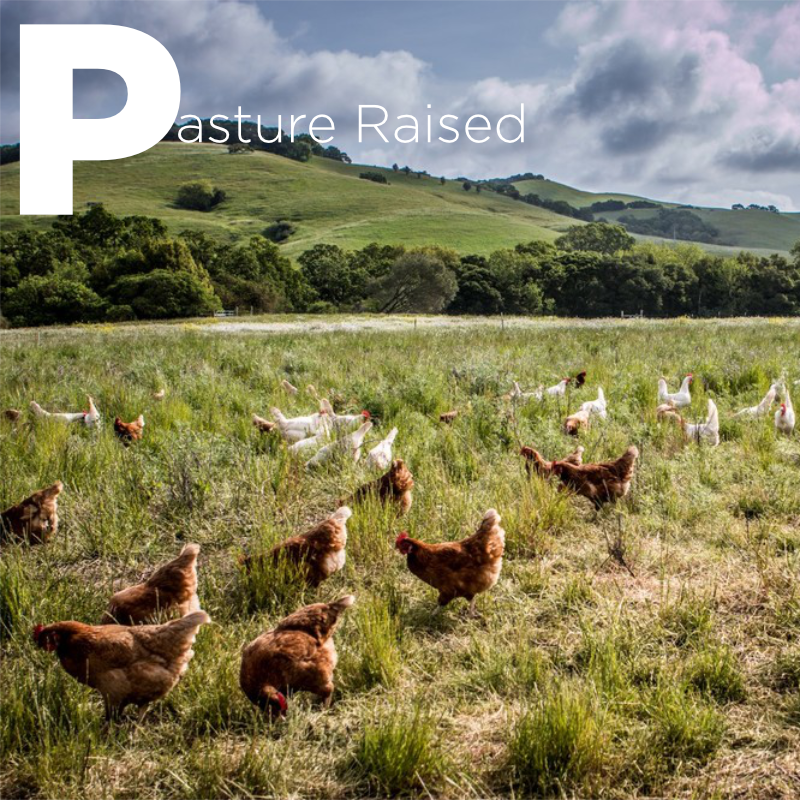
It should be a no-brainer.
We’ve known, for more than ten years, that pasture farming of hens is better for both us, and the birds who lay the eggs.
It’s taken at least that long for widespread, commercially viable pasture farming of chickens to make a big dent in the markets.
Pasture-based egg farming is pretty much what you would think it to be. Hens roam freely over fields.
HFAC’s Certified Humane® “Pasture Raised” requirement is a limit of 1,000 birds per 2.5 acres, or 10sq.m./108 sq. ft. to a bird.
Hens scratch for bugs and worms, in addition to their food, and get a lot of exercise.
The fields where they graze must be rotated, which allows the earth to rest. Chicken scat is washed into the soil, which is consumed by the plants, worms, and bugs in the ecosystem.
Hens are outdoors year-round, with some housing where the birds can go at night to be protected from predators.
They can be brought into barns for up to two weeks a year if there is very inclement weather.
A 2007 study found that pasture raised eggs are nutritionally superior to conventional commercial eggs. Compared to official U.S. Department of Agriculture (USDA) nutrient data for commercial eggs, pasture raised may contain:
- 33% less cholesterol;
- 25% less saturated fat;
- 66% more vitamin A;
- 200% more omega-3 fatty acids;
- 300% more vitamin E;
- 700% more beta carotene
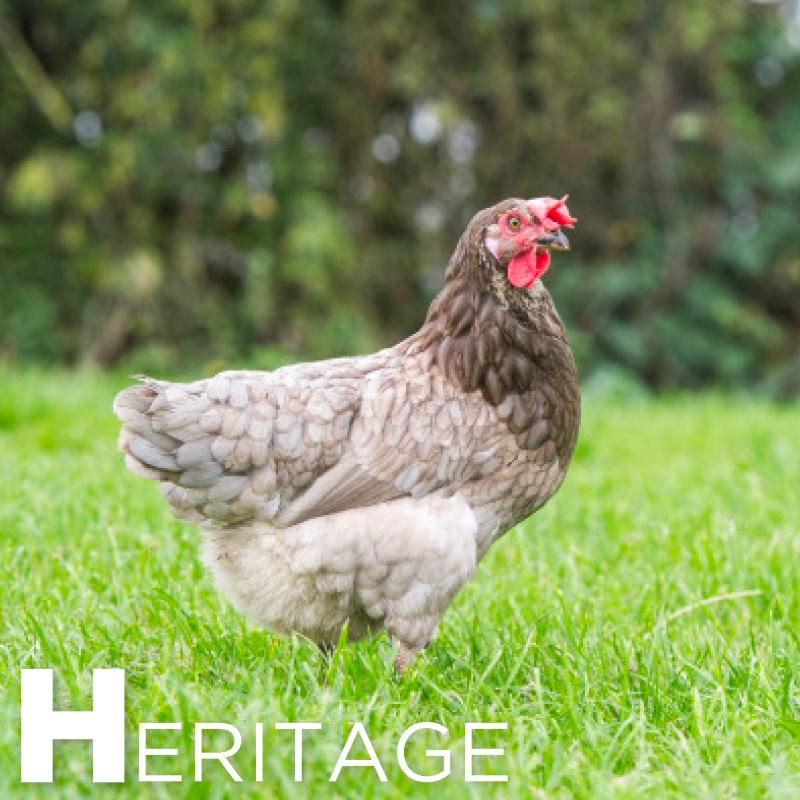
“Heritage” refers to species of chickens that are not bred for high egg production, and tight spaces. Hölzls, Dominiques, Australorps, Sussexes, and Brahmas, among many others, produce the “old school” high quality eggs that are SO good, you may have to adjust how you cook eggs with them. They’re more dense. That’s a richer yolk, and a much fuller white, with less water in the egg.
Heritage birds are more hearty. With thicker tufts of feathers, they’re the kind of foraging hens that are perfect for their natural habitat, large yard, or pasture.
Only a few commercial scale operators have embraced heritage production. Happy Egg Co., is our personal fave, for our teaching kitchen. See the many things that the Jazz Chef creates with these amazing eggs!
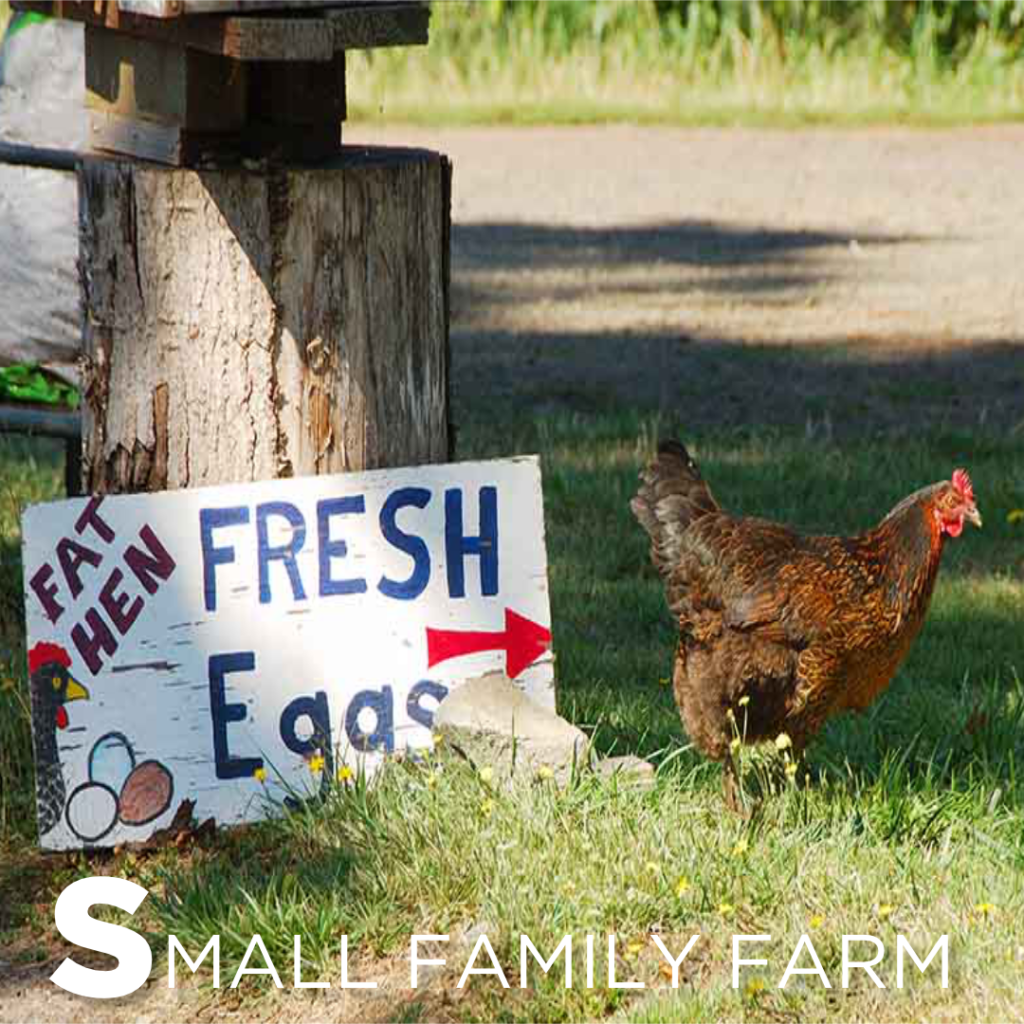
The other good egg is the one that you find from small family farms, and urban farmers. Usually found at small specialty markets, or at outdoor farmer’s markets, or farm/coop-direct, you’re often getting the same kind of quality egg that the higher volume heritage, or pasture-raised farms deliver.
Always good to ask what kind of hens lay the eggs, and how that “family”
farm treats them. There are occasions where a local volume egg producer will show up at a farmer’s market with eggs from mass-producing birds that are just as inferior as the ones that you get from the cheapest egg cartons at the supermarket.
Small producers that have a passion for taking great care of great animals, and delivering top-quality eggs, are ones to respect, remember, and reward!
How to Buy Great Eggs
Pasture-raised, or heritage/locally sourced eggs, side-by-side with a conventional egg, look different.
They’re richer, more orange in color, with the extra beta-carotene in the hens’ diet.
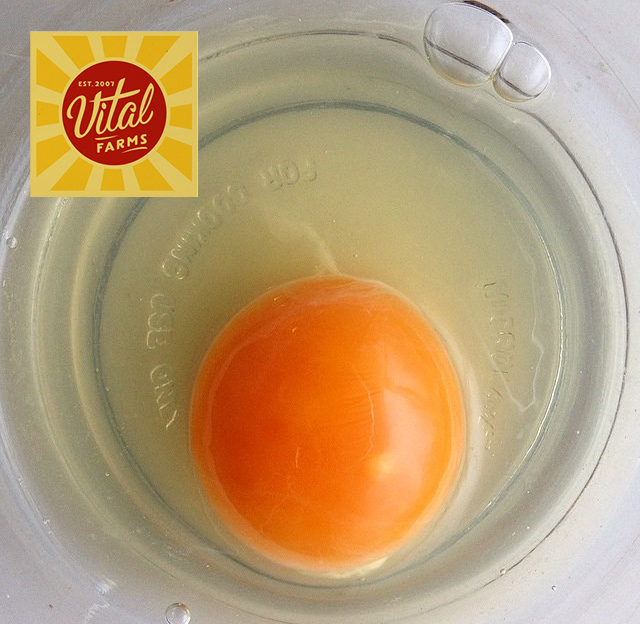
It’s amazing how CHEAP we can be about one of the most common foods, and cooking ingredients, in the world.
We pay a bit more for better ground beef, pork, or poultry. We really spend excessively on beverages, from spirits, to beers, to good coffees and teas. Eggs have always been that place where people feel like they can skimp.
Don’t skimp. Get the good stuff! Buy pasture-raised eggs.
The pasture category is not only getting more crowded, but it’s diversifying.
Vital Farms
When I first wrote this article, there was only one producer, nationally, of pasture raised: Vital Farms, a Texas producer which was kick-started with some Whole Foods’ venture capital money.
It now has more than 90 family farms all over the United States that pasture-raise their eggs, selling under the Vital Farms red dot.
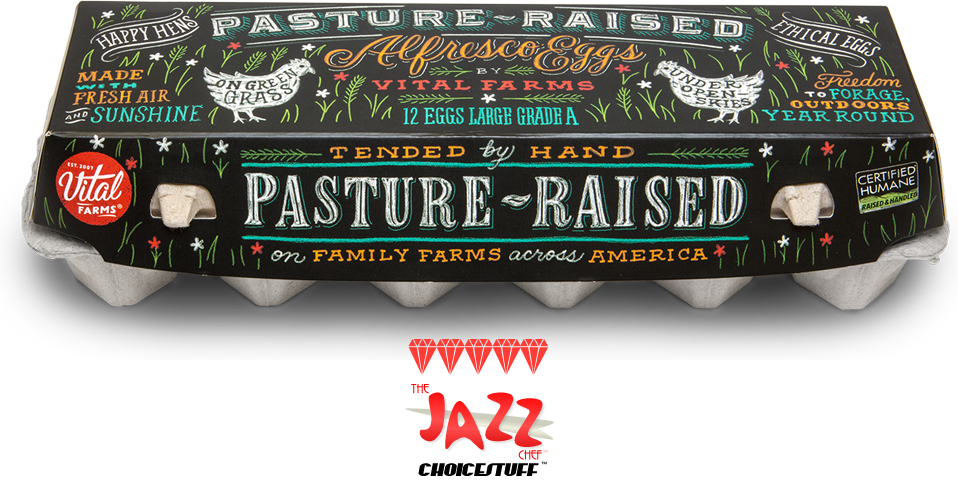
Their eggs run $5-7/box, depending on your area, and how competitive the pasture-raised category is getting. They’re an eggscellent choice (sorry), nationally, but no longer the only one.
New Breed on the Block – Heritage Eggs
One of the new wrinkles, in 2020, are premium eggs from “Heritage Breed” hens. They’re chicken sub-species from the pre-industrial farm days. Eggs that you’d more commonly see from small, local producers at a farmer’s market. One company, nationally, features them, although you can find many local producers that hit farmers’ markets with them.
The Happy Egg Co.
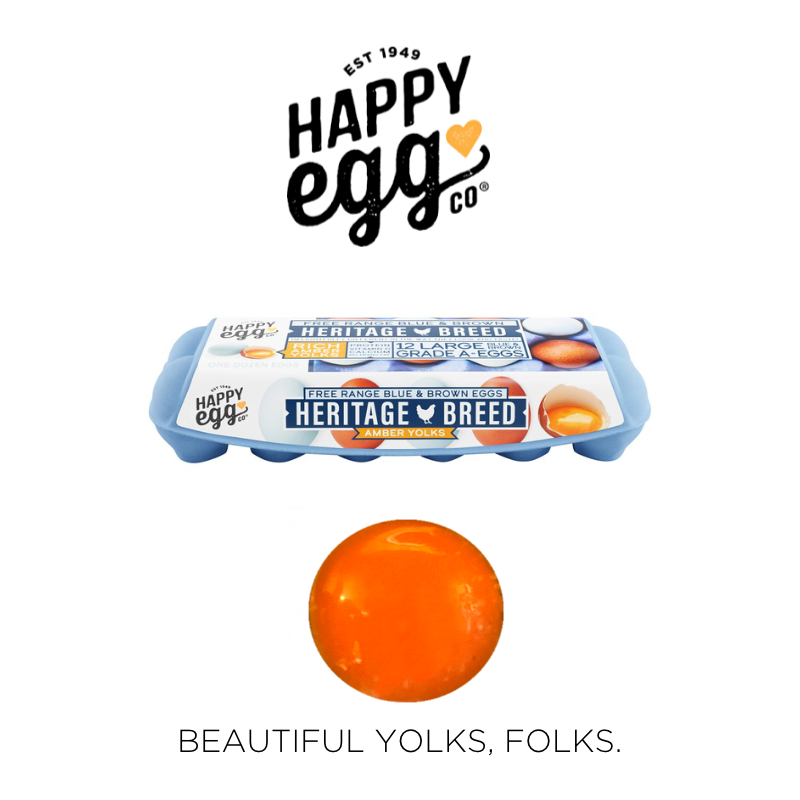
The Happy Egg Co. offers both price-competitive eggs to Vital Farms, and a premium “Heritage Breed” egg, which is very pricey, about $8.19/dozen here in Florida, as of this writing, but the results of what they do to transform recipes… Look at my Swedish pancakes, made with Heritage Breed eggs:
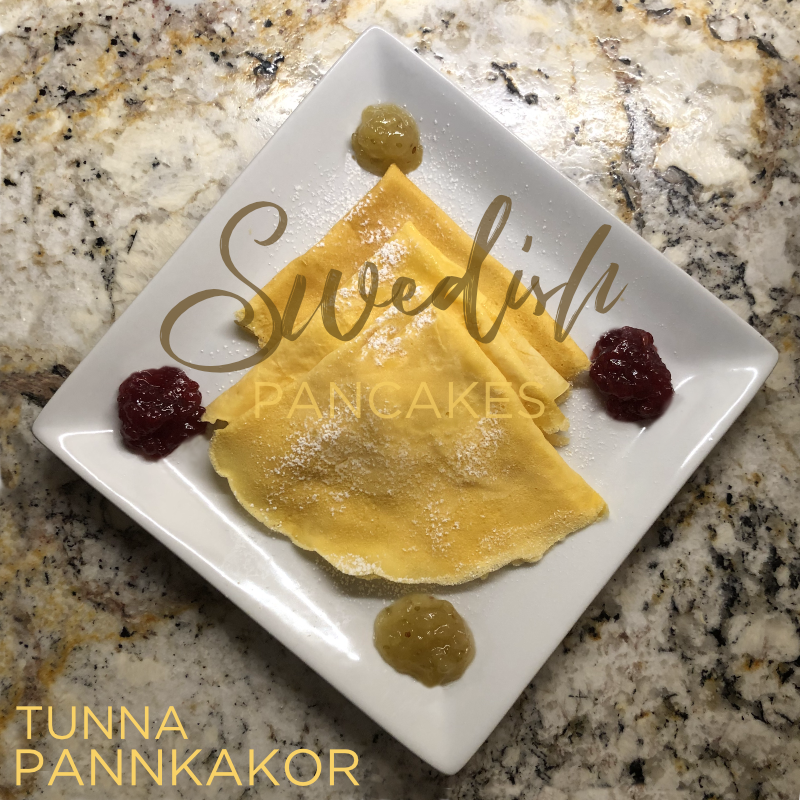
See how much the added beta carotene in the egg brings out the color of the pancake?
The taste, which depends on the egg, also amps up quite a bit, even from other pasture-grade eggs like Vital Farms, or The Happy Egg company’s regular pasture-raised.
Does the Shell Color Matter?
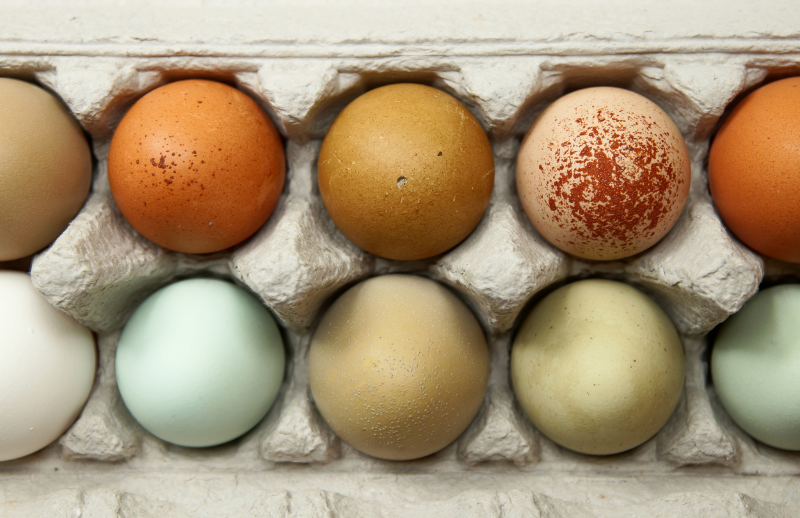
No, and yes.
No. All chicken eggs’ taste is a function of their diet, exercise, and, for some breeds, their emotional state. There’s a reason that some breeds were not heavily used for mass egg production. They just aren’t wired for it. Close proximity makes them insane. An insane bird doesn’t produce.
So, yes. White eggs are almost always from factory-farm, mass-production hens. They’re from Leghorns, the most common chicken sub-species. Farmers, and scientists, have used breeding to encourage higher egg production of an easier-to-use egg, with a thinner shell. The conditions in which the hens are kept also contributes to the more fragile eggshell.
Non-white eggs are better.
They come in many varieties. The most common? Brown; and blue. A few heritage breeds produce eggs that are: Speckled brown; green; and even chocolate-colored.
White ain’t right because the hens live in crowded dens, but, if they’re pasture raised, brown gets the crown; blue’s got a cool hue; and no one gets heckled for using a rare speckled.
Egg Labels Worth Knowing
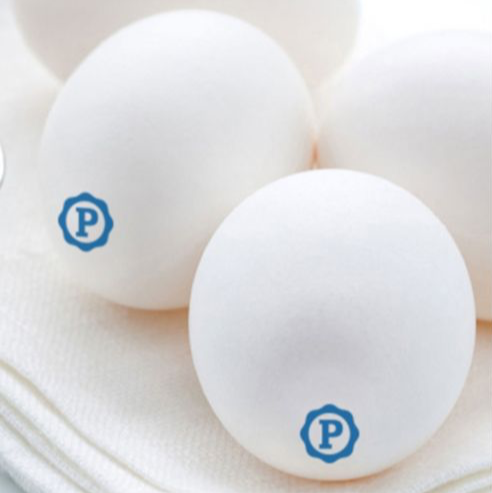
Pasteurized
(Not Pasture-Raised) – Davidson’s Safest Choice® are conventional eggs, but they’ve been pasteurized in the shell.
They’re useful for making cold dishes, from high protein smoothies, to caesar salads, to ice creams in the Ben & Jerry’s recipe style, where you want the safety of a “clean” egg that is certified free of harmful bacteria.
For my germaphobes, don’t spend the money on these, if you only eat cooked eggs. When you cook eggs, where the heat rises above 59°c / 138°F it kills any potential bacteria.
Pasteurized eggs are conventional eggs. They lack nutritional value.
Since we generally don’t worry about the nutritional value of ice cream, though, and smoothies are generally packed with other nutrients, pasteurized eggs are really only best for cold applications of raw egg.
Davidson labels such eggs with a blue “P” to let you know that the egg has been pasteurized.
Egg Labeling That’s Total Hype
Label “lures” – Egg purveyors put all kinds of nonsense out there on the boxes to lure you to spend more money on buzzwords that they know you’ll fall for.
- GMO-Free. The PC pitch. Pasture-raised birds’ feed has to comport to that standard already to be pasture-raised. Pure marketing hype, right up there with the “gluten free” label that I saw on one brand of chicken. Silly.
- Organic – The other big pitch. We’re conditioned to think “organic” anything is better. Here, it just means that the feed that the birds receive, if they’re grain fed, is organic grain. That’s good, though, right? Not really. Organic grain can be the low-grade leftovers of organic grain products for humans. The remnants, lacking nutrition, are used in conventional egg operations, often with cheaper nutrient boosters. As long as the grain was raised organically, it passes the label test.
- Omega-3 boosts – Farms touting this on their boxes usually add flax to the diets of their mass-production hens. It may make a caged hen’s mediocre egg a bit better, but they’re still eggs lower in nutrition, when compared to a pasture-raised egg. Pasture-raised are naturally higher in Omega 3, and outstrip the “diet-augmented” caged egg.
Most Omega-3 is wasted by you, though. If you read my article on cooking the perfect egg, you’ll realize that 99% of pros, and home chefs alike, cook most of the Omega 3 out of the eggs anyway, using too much heat.
- Vegetarian Fed – Birds that can forage produce better eggs. If you are vegetarian and eat eggs, it is good to understand that the birds are better off eating what they like. Your diet isn’t theirs. Most of them aren’t too PC about downing a worm, or ten.
- Hormones/Antibiotics Free – More marketing mendacities. Laying hens aren’t given hormones ever. Hens requiring antibiotics are taken out of production of eggs for human consumption.
How To Pick Out Great Eggs
Now that you know what the right kind of eggs are to buy, how do you sift out all of the brands?
- What’s a good box of eggs?
- Is it better to buy at the market, or wait for a farm at a farmer’s market?
- What should I watch out for?
What to Watch For:
- Egg brands – Eggs never landed much of a premium, or even much distinction from farm-to farm, until “Egg Beaters” started selling as a low cholesterol diet alternative through good branding. The farms jumped in. So now the game is on!
- Cool box – Pretty packaging isn’t a guarantee of great eggs, but it’s also not a total scam.
- Carpetbagger Egg Companies – Dairy farms with big names have jumped into eggs to see if you’ll take your brand-loyalty with you.
- Feel Matters – Shell strength says something about the production. Legit pasture eggs are laid by hens that produce eggs built to withstand mother nature. Standards in the industry are voluntary, and egg scams are on the rise.
- Open the box, and look at the eggs. Pick one up.
- Shells should be solid, not thin. Put a thin commercial egg and a pasture egg in each hand. Don’t worry if anyone is staring at you in the egg aisle. You can feel the difference.
- Size Matters – Some pasture producers put out eggs as they come. So you’ll get a jumble of sizes. Some size like every other egg company. If you can use different sized eggs for different applications, then the jumble may be okay. If not, then get the consistent sized with good strong shells.
- Smell Matters – If there is a decided bacterial smell, or a strong whiff of sulfur which salmonella bacteria put out, avoid.
- Condition of the Box Matters – If the box is wet, or egg-stained or other than firm, clean-smelling and right, grab another box, or another brand. Some companies use cheap boxes that damage eggs easily. If they aren’t willing to spend money to package them right to get them to market, what does that say about their “thrift” in production?
- Date Matters – Look at the dates on the boxes. My big green Southern supermarket loves to buy stuff on the bare edge of its “Best by” or “use by” date, possibly because so many of its customers are probably right near their own “best by” dates.
Great food always starts with great foodstuffs.
A few readers in Europe, and many in other parts of the world, may not think of “sourcing” good eggs as being a problem.
In most parts of the world, there isn’t factory egg farming, as it’s practiced in the United States & Europe: Low quality, thin shell, PALE yolk mass-produced eggs.
Everywhere else eggs are expected to be big, healthy, nutritional, tasty things. Many come right from your, or a neighbor’s, yard.
If you pop open a conventional US egg, next to a top-of-the-line pasture-raised egg, it’s like night and day: One is pale, and putrid looking. The other is golden to yellow-orange, and full of nutrition.
You are what you eat, so let’s understand what we’re eating!
BRANDS THAT I CAN RECOMMEND:
There are very few American egg producers that can hold a candle to the traditional European ones that haven’t sunk into the Yank’s mass-farm fad.
These are my top picks that are widely available nationally:
- The Happy Egg Company Heritage Breed – Best heritage breed eggs on the market in North America. Hens roam on 8 acres, same as pasture-raised, but Happy doesn’t engage in all of the practices, so they can’t call them “pasture.” Still, an amazing egg. Richest of the commercially produced ones that we’ve tried, with the best cooking characteristics. Expensive, but worth every penny, until more heritage breed eggs compete and drive down prices;
- Vital Farms Pasture-Raised Alfresco Eggs; Vital really walks the walk of pasture-farming. They pioneered the commercial form of pasture-raising hens. They still make the best eggs, overall, in the industry, at the large-scale production level.
- Vital Farms Lucky Ladies Pasture-Raised – Whole Foods. Great if you can find them.
- Handsome Brook Farms – Pasture Raised. The group was sued in the ‘teens for false advertising of pasture-raised. They seem to have their act together today.
- Dare to Dream Pastured Eggs. Usually 30% more costly than Vital, but not 30% better.
BRANDS THAT ARE, IN MY OPINION, A WASTE OF MONEY:
Anything “organic” refers to the feed. The conditions in which the chickens live, which has a lot to do with the kind of eggs that they lay, make most of these company’s overpriced produce only a little better than the rank-and-file commercial factory egg:
- Organic Valley “Organic” eggs, in all non-pasture varieties. Nice boxes. They need to up their game in farming them. Not as pale as conventional, but, to us, no noticeable improvement in color, or taste.
- Whole Organic Pasture Raised Eggs – The organic is a gimmick, not worth the price. Go heritage breed instead;
- The Happy Egg Co. Organic – Pandering to those who put label over common sense. Buy their Heritage Breed eggs instead.
- Eggland’s Best Cage Free – The Big Egg producer is testing the waters of big ticket eggdom with the “Cage Free” fad. Not far enough, and they could do a LOT to move the scale of pasture production. PASS.
- Nest Fresh “Free Range” “Non-GMO” eggs. Free-Range is not Pasture. GMO? Really? They’re eggs, not pea plants. All hype. PASS,
- Horizon Organic Free-Range Eggs – Another dairy trying to extend its brand into the egg arena. Go cold turkey, Horizon, and put out the pasture eggs that are worthy of the milk that you produce. PASS.
- The Country Hen, Organic Cage-Free Omega-3 Large Eggs – Uses every hyped ‘biz’ buzzword on the box. Half-dozen. Outrageously overpriced. Egregious hype.
LOCAL FARM-TO-TABLE EGGS AREN'T ALL THAT THEY'VE CRACKED UP TO BE
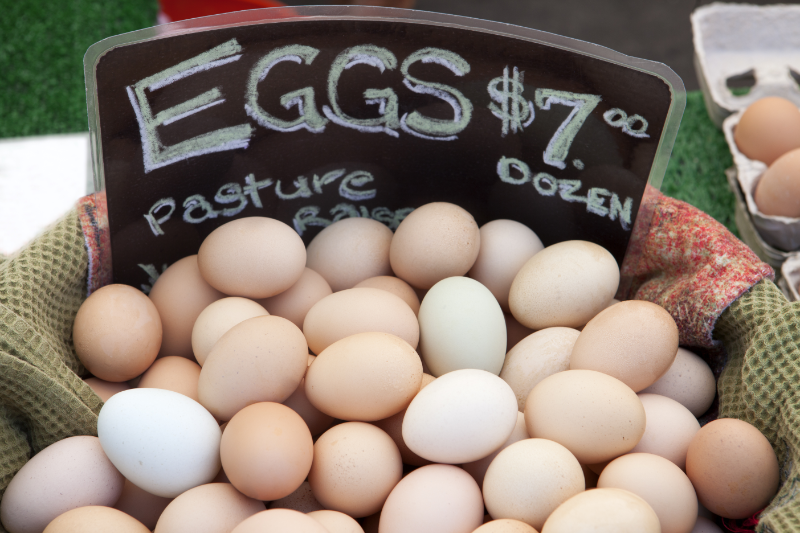
There are a growing number of people who raise their own chickens in their back yards, or on small farms, trying to cash in on the farm-to-table movement by selling them at roadside stands, farmer’s markets, etc.
Locally sourced is good, but several things that you should know if you buy local:
Buying eggs at one of the many local farmer’s markets that have sprung up sounds like a good way for smaller consumers to connect with their egg supplier.
Health-conscious shoppers tend to equate farmer’s markets or small roadside stands with “good” and “healthy” and “socially responsible.”
Don’t assume, just because they’re local, that they’re any of those things. Take reasonable precautions:
- Ask if the eggs are their production. If no, where do they source their eggs?
- How are the hens housed? Ask how they produce. In stores, labels have to be right, or producers can face stiff penalties. Little operators at farmers’ markets have little to no oversight.

- See how the eggs are stored at the point of sale.
A cooler that’s minimally below 4°c/40°F is a must! The lower the temp the better, to keep salmonella, which can find its way INSIDE the egg, randomly, from growing.
Thus this “homey” egg display, that you’ll see at many spring, and summer farmers’ markets, is a bacteria farm. Warm eggs provide a breeding ground for salmonella.
If there is any indication that they’ve been out at room temperature, the heat, in the sun, avoid them!
- Some roadside eggs will be in coolers. If the cooler isn’t below 4°c/40°F, take a pass.
- Avoid reused boxes. A growing number of aspiring egg farmers grab used egg crates or egg palettes from restaurants and bakeries, sometimes even from dumpsters. That soft cardboard is a breeding ground for bacteria. If there is any sign of staining, or crusted dry egg on any of the boxes, don’t buy from that vendor!
Local Egg Culture
If you’re new to the area, and want to buy from folks hawking eggs on their property or at stands by the roadside, ask locals about the stands. Which ones are for real, safe, and which ones are not? Usually, people who live in the area know the great, good, and bad.
Handling & Storage
Wash, Dry, & Store Covered.
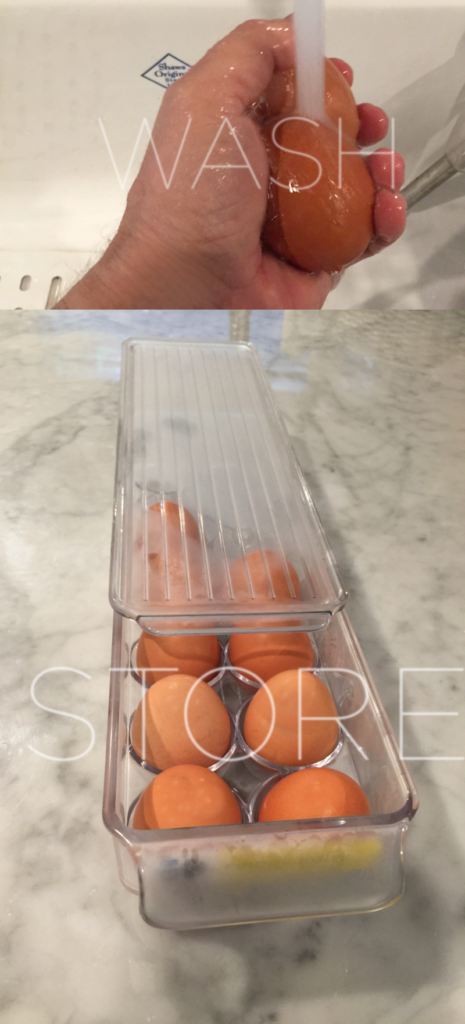
Keep your eggs in the egg crates that the farm ships them in? Think about what you just put into your refrigerator.
Eggs, and their boxes:
- No matter how much they sanitize production equipment, or packing facilities, dirt, and salmonella, can be found commonly.
- Handled by people throughout the process, from the farm to the packing, and unpacking.
- Handled by the people who got there before you, opened them and thought…”Nah… I’ll buy the cheaper ones.” They may also have the sniffles, or worse.
- Let’s not forget the box itself! Dirt, broken egg matter, and salmonella contamination of the box materials are all possible.
Once in a while, you’ll catch the occasional bit of grass stuck to the shell, or the odd partial feather that falls into any commercial eggs.
There is always the chance of salmonella bacteria on the outside of eggs. The bacteria can be on the inside, although it’s rarer. Mostly salmonella comes from handling dirty shells that have trace amounts of fecal matter that carry the bacteria. Most of that cooks off easily, but if you touch the eggs, then pick up a utensil, you can carry the bacteria.
The eggs are washed at the crating point? Maybe. That doesn’t mean, though, especially for the pasture raised eggs, that they’re entirely clean.
Even Safest Choice® pasteurized eggs’ shells can, because of handling by people down the line, have outer shells with some contamination. An egg or two break, in another box, and Sparky the Stocker, who has been handling other eggs, without washing their hands, adjusts an egg, or two, from the broken carton to fill out the dozen.
Safe Handling Practices:
I’m no germaphobe, but because egg crates are truly nasty, you should:
- Ask the market to bag the egg crate separately, then put it in a recycle/re-use bag;
- Inspect them for debris. Remove anything visible;
- Wash eggs in cold water. prevents the eggs from sweating, which draws their liquids to the micropores of the shell;
- Carefully dry them with a clean cheap kitchen towel;
- Put eggs into your own plastic egg container with alid, to keep down recirculating air contact with your eggs, that dries them out;
- Write expiration dates on a tag for your container.
- Get eggs into the refrigerator quickly, after purchase. Always keep them refrigerated at least at 4°C/40°F.
- If you need eggs for a recipe, pull them out, then put the unused eggs back into the refrigerator immediately. Many of y’all leave ingredients out on the counter. The warming/cooling repeatedly? Not a good idea, in general, but especially bad for eggs!
- Don’t leave eggs uncovered, or in most “egg” drawers, built into some refrigerators. Most of them let too much dry air in. Refrigerators can wickedly dehydrate eggs, which do sweat a bit of their moisture through the shell, over time.
OTHER GOOD DO's and DON'Ts
There are a few other ways that you can get the best use of your eggs, and make better egg dishes:
- DON’T buy too many eggs. Unless you bake egg-based stuff a bunch, that Costco flat of eggs may seem really appealing, but storing all of them means that they age, and eggs don’t age well;
- DO wash your hands frequently when handling eggs. Even if you’ve cleaned them, you may reintroduce bad bacteria from other surfaces in your kitchen, or on tools that you’ve been using;
- DON’T taste batters or anything made with raw eggs unless you are using Davidson’s Safest Choice® or other pasteurized (not pasture) eggs;
- DO wash any spatula, whisk, etc. occasionally during cooking to reduce the risk of reintroducing bacteria to foods already past the temp point where they cook off;
- DON’T use utensils with wooden spoons or forks to prepare or serve eggs. They can harbor bacteria that is conveyed to the cooked food.
Finally...
It’s a lot of information about eggs, BUT, now that you know, you can buy the right egg for the right task, get better nutrition for your family, and keep your eggs safer until you use them!




